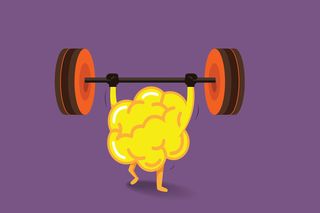How to get bigger and stronger by thinking harder
Use the power of your brain to help you improve on your size and strength

How can my brain make my muscles bigger?
Your muscles are controlled by your brain via neural pathways that connect to each and every one of your muscles. Electrical impulses from the brain tell your muscles to contract and relax, and it’s these actions that allow you to do everything from standing to running to lifting a weight.
Most of these actions are subconscious: you move without thinking about the muscles involved. But if you do think about the movements, especially when training, you will improve your mind-to-muscle connection – and this can result in bigger gains.
How does that work?
Think of these neural pathways as being like a motorway. If the road isn’t well maintained or used that often, traffic will build up and it will take longer to get to your destination. But if it’s improved by constant attention, traffic runs more smoothly. The better shape these neural pathways are in, the quicker the signal from your brain will reach your muscle.
Why is this important to weight training?
The speed at which the signals reach your muscles has a significant effect on size and strength. A fast signal means your muscle can contract harder and faster – making it stronger and more powerful – while also recruiting more muscle fibres, which will lead to new muscle growth.
Get the Coach Newsletter
Sign up for workout ideas, training advice, reviews of the latest gear and more.
Is this what is meant by ‘muscle memory’?
No, it’s not quite the same thing, although that’s also to do with neural pathways. This refers to you becoming better and more efficient at any physical task – whether it’s driving, typing or playing the piano – the more you do it. Repetition trains the neural pathways so signals from the brain travel quickly, and the muscles are better equipped to execute the task.
How do I improve these pathways for bigger gym gains?
Going to the gym consistently will enhance these connections because you’re improving your muscle memory. The simplest way is to literally think about your muscles when doing a move. Slowing each rep and focusing on how it feels to move the weight, feeling the muscle contract and extend through the full range of motion, and taking care to flex at the top of the move will all help.
Will I need to decrease the weights I lift?
At first you will, but remember your muscles have no idea how heavy that dumbbell is – all they care about is whether they’re capable of completing the job at hand. Decreasing the weight means you are also less likely to do jerky reps that rely more on momentum than muscle, and will be able to complete full range-of-motion reps.
Mental edge
Get bigger and stronger by keeping these points in mind
- Going to the gym regularly will result in the links between your brain and muscle becoming stronger
- Looking at and thinking about your muscles also improves these connections
- Flexing your muscles at the top and bottom of each rep builds stronger pathways so the muscles can contract quicker
Coach is a health and fitness title. This byline is used for posting sponsored content, book extracts and the like. It is also used as a placeholder for articles published a long time ago when the original author is unclear. You can find out more about this publication and find the contact details of the editorial team on the About Us page.

